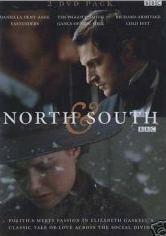I am currently reading the book North and South. I watched the BBC mini-series based on the novel by Elizabeth Gaskell, and I fell in love with the storyline. The story is of a strong-minded young woman who grew up in the wealthier south of England and is forced to move to the industrial north after her father gives up his profession as an Anglican vicar. Margaret is found guilty of romanticizing the south as she experiences the people and ideals valued by the north. This story deals with the issues of the day of the Victorian Age, such as the value of education vs. hard work, religion vs. work time, social status vs. relationships, and of course, the north vs. the south. Margaret begins to see that she has been prejudiced against the north and many of its people. Eventually, Margaret's eyes are opened to see the beauty of the north and its industry.
I started reading the novel with Matt (see reading buddies below), and I am excited to see how it compares and contrasts to the mini-series. The ending of the book has a lot to live up to since the end of the mini-series is one of the most perfect endings (in my opinion) of all time. So far, the book has been very good, and the mini-series appears to have stuck pretty close to the book's plot.
I am one of those readers who does not like being held responsible for giving away the plot of a book, but I will introduce another character of the book, Mr. Thornton. Mr. Thornton is the owner of one of the cotton mills of Milton. At first, Mr. Thornton appears a very hot-tempered, abrasive, and prideful man who was lucky enough to be blessed with such good fortune as to be the master of a cotton mill. Is Margaret's first instinct about this man correct, or is Margaret simply jumping to conclusions? Only time and the reading of the novel (or the watching of the mini-series) will tell. Below are the first two clips of the mini-series, North and South. Hope you enjoy!


